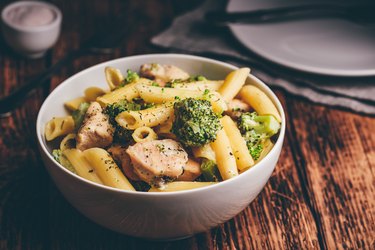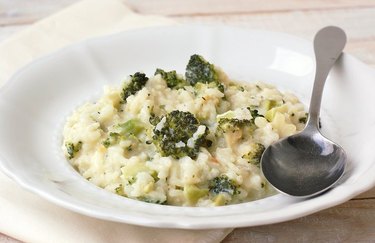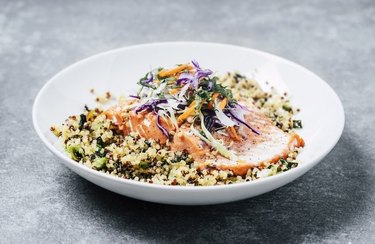
Eat your veggies: What kid didn't hear this growing up? Funny thing is, we still have to remind ourselves, even as adults.
There's such a big focus on veggies from dietary guidelines to advice from doctors and dietitians because they're really just that good for you. Cruciferous vegetables like broccoli, kale, cabbage and cauliflower, have unique phytonutrients, which have beneficial effects on our health, as outlined in a December 2017 paper in Molecules.
Video of the Day
Video of the Day
Cruciferous vegetables are rich in ascorbic acid, phenolics, carotenoids, and a phytonutrient called glucosinolates. These compounds are what give cruciferous veggies the ability to help reduce LDL cholesterol, reduce inflammation, remove harmful chemicals from our bodies and so much more.
How you prepare these vegetables can have an influence on these healthy components. For instance, a June 2019 study in Preventative Nutrition Food Science found that raw cauliflower has higher antioxidant activity compared to cooked, but steaming is better than boiling in retaining specific nutrients. Similar research in a July 2019 analysis in Foods found that certain phytonutrients were better retained when steamed or stir-fried compared to boiling.
While this is interesting (and generally, you want to avoid overcooking your veggies), the main objective should be to just eat more vegetables. That's why we've pulled together six cruciferous vegetable recipes featuring broccoli, cauliflower, watercress, rutabagas and more to show you how to cook cruciferous vegetables to reap their benefits. Enjoy!
1. Vegan Broccoli and Sage Risotto
If you've ever ordered risotto, you know you're in for an indulgent treat with its rich, savory flavor and equally decadent texture. Traditional risotto is made with Arborio rice, butter, white wine, chicken broth and parmesan cheese, along with fresh herbs and spices. This vegan version is made much healthier by cutting out the cheese and butter and using coconut milk and olive oil instead.
Including cruciferous broccoli, along with butternut squash, adds vitamins, minerals and phytochemicals, helping to round out the dish. Broccoli is also rich in glucosinolates, a compound known for its potential anti-cancer effects.
Get the Vegan Broccoli and Sage Risotto recipe and nutrition info here.
2. Stir-Fry Noodles
Cruciferous vegetables like broccoli, bok choy and cabbage lend themselves well to Asian-inspired cooking. And stir-frys are great because you can really use almost any vegetable you have on hand, which makes meal planning easier and helps to cut down on food waste. Speaking of food waste, for many cruciferous vegetables, the majority of the plant is edible, including the leaves, flowers, stems and buds, according to North Carolina State Extension.
To create a healthy stir-fry, follow the principles of this recipe: Use whole grains like brown rice or whole-wheat noodles, choose a lean protein like chicken or tofu and load up on the vegetables. This recipe calls for six cups of any veggie of your choosing.
Get the Stir-Fry Noodles recipe from Well Plated by Erin.
3. Rustic Rutabaga Fries
When we hear "cruciferous vegetables," our minds usually go to cauliflower and broccoli. But, rutabagas are a cruciferous veggie, too. They're a starchy root vegetable, which is why they work so well as fries, like in this recipe.
Potatoes are nutritious but if you're looking for something a little different, go with rutabaga. We especially love this recipe because the vegetable is baked, not deep-fried, and it calls for heart-healthy olive oil.
Get the Rustic Rutabaga Fries recipe and nutrition info here.
4. Turmeric-Spiced Whole Roasted Cauliflower
To reduce carbs and up the nutrition, we've seen cauliflower used to make mashed potatoes, pizza crusts, rice and gnocchi. But what about loving cauliflower for what it really is? This recipe keeps things simple by roasting an entire cauliflower.
Cauliflower, along with other cruciferous vegetables, contains a phytochemical called sulforaphane. Early research suggests this compound is linked to helping protect us from diseases related to the brain and nervous system like Alzheimer's disease, according to an April 2019 study in Brain Circulation.
Get the Turmeric-Spiced Whole Roasted Cauliflower recipe from Cookie + Kate.
5. Sweet Potato Pasta With Brussels Sprouts
Pasta gets a bad rap, which is unfortunate because it can actually be quite good for you. This recipe shows you how by pairing whole-grain pasta with nutrient-dense foods like broccoli, onion, sweet potato and fresh sage.
Brussels sprouts are high in fiber — a cup of the cooked veg has 4 grams of fiber and, surprisingly, 4 grams of protein. They're extremely high in vitamins C and K — the same one-cup serving provides more than 100 percent of the Daily Value (DV) of both.
Get the Sweet Potato Pasta With Brussels Sprouts recipe from Well Plated by Erin.
6. Salmon and Broccolette Superfood Salad
Broccolette, also known as broccolini, is a cross between two cruciferous vegetables: broccoli and Chinese kale. It looks like a taller, leaner version of broccoli as the stems are longer and the florets are smaller in size. It has a peppery, more pronounced flavor as well.
This recipe actually contains two cruciferous vegetables, the broccolette, yes, but watercress is a cruciferous veggie, too. This provides twice the support in protecting against cancer-causing compounds created when grilling animal proteins, according to a small September 2004 study in Carcinogenesis. Cruciferous vegetables help to excrete carcinogens from our bodies, so try pairing meat with these veggies like the grilled salmon called for in this recipe.
Get the Salmon and Broccolette Superfood Salad recipe and nutrition info here.
- Molecules: "Bioactive Compounds in Brassicaceae Vegetables with a Role in the Prevention of Chronic Diseases"
- Preventative Nutrition Food Science: "Effect of Cooking Method on Antioxidant Compound Contents in Cauliflower"
- Foods: "Influence of Cooking Methods on Glucosinolates and Isothiocyanates Content in Novel Cruciferous Foods"
- North Carolina State Extension: "Brassica Oleracea (Italica Group)"
- Brain Circulation: "The Neuroprotective Mechanisms and Effects of Sulforaphane"
- MyFoodData: "Brussels Sprouts (Cooked)"
- Carcinogenesis: "Cruciferous Vegetable Consumption Alters the Metabolism of the Dietary Carcinogen 2-amino-1-methyl-6-phenylimidazo[4,5- b ]pyridine (PhIP) in Humans"





